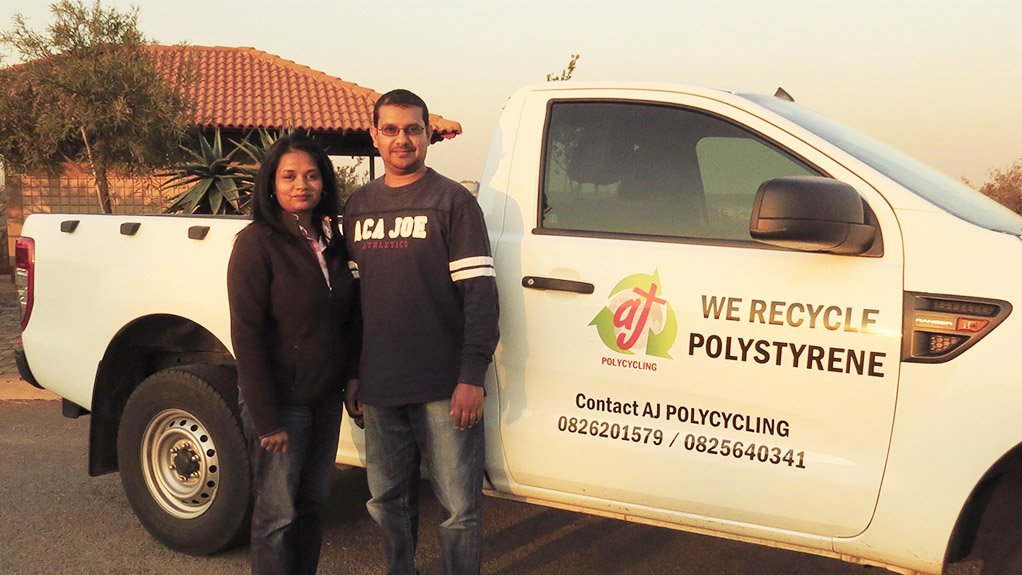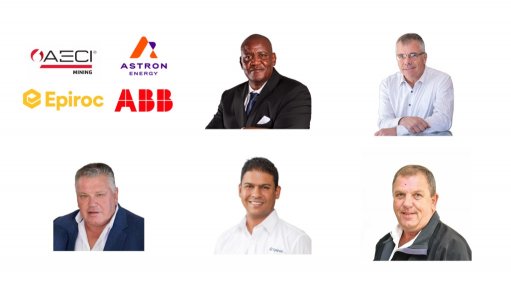Polystyrene Collectors In Gauteng Help Industry Reach Recycling Success
This article has been supplied as a media statement and is not written by Creamer Media. It may be available only for a limited time on this website.
Dynamic duo shifts focus to polystyrene collection to help meet recyclers’ demand
Deena and Joelene Moodley of AJ Polycycling
South Africa’s success with the collection and recycling of post-consumer polystyrene continues to grow thanks to the combined effort of collectors and recyclers around the country. Despite its label of being “difficult to recycle plastic”, polystyrene recycling figures have continued to grow over the past eight years.
“The applications and uses for recycled polystyrene continue to grow in South Africa thanks to the unique combination of little bit of innovation, a lot of hard work and the can-do attitude of entrepreneurs who see possibility and opportunity in the unlikeliest of places,” confirms Adri Spangenberg, Chief Executive Officer of the Polystyrene Association of South Africa.
Last year alone, more than 5 000 tons of polystyrene were diverted from landfill and recycled into other products such as seedling trays, retail coat hangers, cutlery, furniture components and picture frames. South Africa currently has 27 recyclers on record who convert recyclable high impact and expanded polystyrene into raw materials or cement blends. According to Adri, the biggest and fastest growing end-market for recycled polystyrene in South Africa continues to be the lightweight concrete bricks, owing to the fact that this application can use white, black and coloured food trays or take-away containers.
Given the fact that polystyrene is 96 % air and only 4 % product, 5 000 tons of product is an impressive amount of material that was collected and recycled from households and businesses around the country. However, the light weight of the material that makes it the packaging material with the smallest carbon footprint, also causes logistical headaches for collectors who have to transport the material.
“We are currently working with role-players of the entire polystyrene value chain on finding sustainable solutions to the problem of effectively moving air. By installing mobile balers and the ingot machine at some of our bigger collectors and recyclers, the volume of the material is greatly reduced - making it viable to transport.
Because there is such a high demand for the material, we need to ensure that we are able to collect as much of the material as possible, and that it gets delivered to recyclers as quickly and consistently as possible,” Adri says.
One collector who helping to keep the supply chain to recyclers moving is reaping the benefits of this growing demand, is AJ Polycycling. Owned and managed by Deena and Joelene Moodley, this Centurion-based business has extensive experience and a passion for plastics recycling, but has recently decided to shift its focus to polystyrene recycling.
“We started our business in 2014 because of our desire to help create a sustainable environment. We not only wanted to create a successful business, but also wanted to contribute to developing a sustainable and responsible South Africa,” Deena says.
Although they initially focused their efforts on recycling Polypropylene and HDPE plastics, Deena and Joelene noticed an opportunity to supply polystyrene to customers who were manufacturing picture frames from recycled polystyrene in 2016. Today, they supply material to customers in the greater Gauteng area covering areas such as Pretoria North, Pretoria East, Johannesburg East, Johannesburg South and Johannesburg North.
“There is a huge demand for recycled polystyrene. Thanks to continued technological advances, plastics have begun to replace metal and wood in many manufacturing processes. This increase has made it imperative that plastics be recycled and re-used to avoid it ending up in waste streams and landfill sites.
This growth in plastic recycling has also increased the demand for the material, and we are focussing our efforts on supplying this polystyrene to buyers are in the décor industry who use it to manufacture picture frames. We have also recently begun to expand our business and now supply to manufacturers in the building and construction sector who create lightweight concrete bricks and screed,” Deena explains.
AJ Polycycling collects the polystyrene from a wide range of different sources, ranging from large corporates and retailers, to medical suppliers, food packaging producers and even financial services. They work closely with waste management who are able to provide them with the quantity and quality of polystyrene they need to supply to their customers, and even provide assistance to companies and start-ups who want to embark on a business within the plastic recycling industry by offering advice on setting up a recycling business, sourcing and setting up of machines and business and financial strategies.
“Our volumes vary each month depending of the quality of polystyrene we can source. It ranges anything from 1-5 tons per month. The demand that we have for polystyrene, however, outstrips the supply. Unfortunately, often the material we do get is dirty and contaminated with food or liquid, making it difficult to be used in the recycling process. Households and businesses need to realize the importance of correctly recycle polystyrene, especially in view of the fact that recycling will become compulsory in Johannesburg from the 1st of July 2018,” he says.
In light of these recent developments, AJ Polycycling is looking to increase their capacity and volumes of polystyrene they collect for recycling. “Food and protective packaging made from Expanded Polystyrene (EPS) and products such as CD cases, yoghurt tubs and plastic cutlery made from High Impact Polystyrene (HIPS) are in high demand by recyclers who use them to improve lives by building affordable houses and create jobs in a variety of different industries.
Although these are considered single use plastics, I believe banning these products will place a huge demand on natural resources and increase costs as manufacturers will be forced to use virgin materials. We consider ourselves as enablers who are helping to overcome the environmental challenge of “what to do with polystyrene waste” that society is currently faced, while generating income at the same time. This certainly is a very exciting time to be in the industry!” Deena concludes.
Comments
Press Office
Announcements
What's On
Subscribe to improve your user experience...
Option 1 (equivalent of R125 a month):
Receive a weekly copy of Creamer Media's Engineering News & Mining Weekly magazine
(print copy for those in South Africa and e-magazine for those outside of South Africa)
Receive daily email newsletters
Access to full search results
Access archive of magazine back copies
Access to Projects in Progress
Access to ONE Research Report of your choice in PDF format
Option 2 (equivalent of R375 a month):
All benefits from Option 1
PLUS
Access to Creamer Media's Research Channel Africa for ALL Research Reports, in PDF format, on various industrial and mining sectors
including Electricity; Water; Energy Transition; Hydrogen; Roads, Rail and Ports; Coal; Gold; Platinum; Battery Metals; etc.
Already a subscriber?
Forgotten your password?
Receive weekly copy of Creamer Media's Engineering News & Mining Weekly magazine (print copy for those in South Africa and e-magazine for those outside of South Africa)
➕
Recieve daily email newsletters
➕
Access to full search results
➕
Access archive of magazine back copies
➕
Access to Projects in Progress
➕
Access to ONE Research Report of your choice in PDF format
RESEARCH CHANNEL AFRICA
R4500 (equivalent of R375 a month)
SUBSCRIBEAll benefits from Option 1
➕
Access to Creamer Media's Research Channel Africa for ALL Research Reports on various industrial and mining sectors, in PDF format, including on:
Electricity
➕
Water
➕
Energy Transition
➕
Hydrogen
➕
Roads, Rail and Ports
➕
Coal
➕
Gold
➕
Platinum
➕
Battery Metals
➕
etc.
Receive all benefits from Option 1 or Option 2 delivered to numerous people at your company
➕
Multiple User names and Passwords for simultaneous log-ins
➕
Intranet integration access to all in your organisation




















